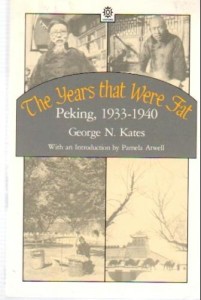Shanghai – First Impressions No.15 – George Kates Comes to Start his Fat Years, 1933
Posted: September 3rd, 2013 | No Comments »Utterly Different From That Already Familiar – George N Kates – 1933
George Norbert Kates was an art historian, curator of oriental art and author of several books including Chinese Household Furniture (1947) and The Art Of Being Old (1956) as well as The Years That Were Fat (1952), a memoir of old Peking, from which the excerpt below is taken. Kates lived in China between 1933 and 1940, and then again briefly between 1943-1945.
Sheer Folly
Early in the following year, now well launched upon a course that might seem to other, I knew, sheer folly, I decided to take passage in a ship, and go to China itself. The reader should know at this point that I had very little money with which to do this. A margin account with a large brokerage firm that had gone into bankruptcy had transformed nearly all my Hollywood earnings into pure fool’s gold. In time, I came to see that this final transmutation, this reversion of the intrinsically base and unstable back to itself once more, did fittingly end my California adventure.
So I went to the Boston Common, one tender spring afternoon, when thoughts floated naturally away towards other horizons, to do business at Cook’s. With a ticket in my pocket for a berth n a ship going trough the Panama Canal, and thence to Victoria, in British Columbia (where I was to transfer to the Canadian Pacific’s white Empress of Asia), I felt confident that I had veered not away from, but comfortingly nearer to my true, if still little revealed course.
There came a morning, after several weeks of travel, when looking through the ring of my brass porthole, low in the ship, I gazed for the first time down upon muddy and swirling, yellow-brown and summer-warm waters, the estuary of the Yangtze. Later, after a long day, Shanghai finally loomed ahead, the smoke-filled air of its curving Bund reminiscent of mighty London. Here, halfway across the world, I had reached a metropolis again – yet one with components utterly different from those already familiar.
Here I disembarked, each minutes filled with new sensation. Half-stripped coolies in multitudes, turbaned Sikhs, White Russian water police; occasional curving Chinese roofs between newer buildings, rickshas, giant advertisements in characters: actors and scenery, all were different. Passing through customs I made my way without haste, through dead urban air, to an international hotel. I well knew that this was not China, although there were native elements in the amalgam.
In Shanghai, therefore, I remained for but one night, dining amid the babble of the hotel restaurant; and departing on that following for Nanking. I wished to be on my way. Nanking, then the capital, became another torrid day, spent largely from breakfast onward in the darkened and shady house of our Consul General. That evening at Pukow, the broad Yangtze crossed by ferry in late rosy light, voluble Chinese in fluttering silk gowns fanning themselves beside me, I entered the Shanghai Express, that very slow train, which crawled haltingly towards the tawny northern plains, to my destination from the beginning, Peking.
Somewhere on the journey, as the wind blew the golden dust of North China over the earth’s gentle slopes, amid low mud-walled farmhouses and everywhere grave mounds made of the soil itself, I arrived in the country that for the next seven years of abundance was to become intimately my own.
Â
George N Kates, The Years That Were Fat: Peking, 1933-1940,
Â

Leave a Reply